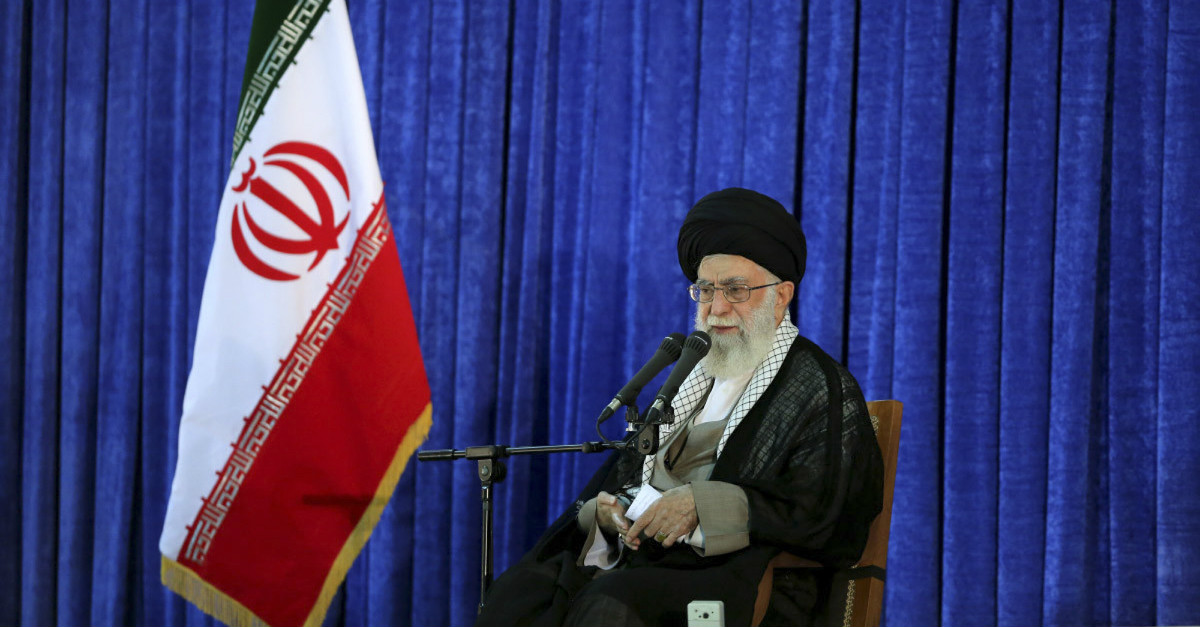President Donald Trump has been in office for a exactly two months, but there are still no hints as to what his policy toward Iran will be. All we really have to guide us are a couple of comments that Trump made on the campaign trail, his trashing the Iran nuclear agreement as the most incompetent deal ever negotiated in the history of mankind, and his promise to put Iran “on notice.”
Videos by Rare
Needless to say, the Iranians weren’t particularly impressed with the Trump administration’s “on notice” remark. If they were, Tehran would have thought twice before continuing to test ballistic missiles or ceased irritating the U.S. Navy in the Strait of Hormuz. The slapping of additional sanctions on more than two dozen Iranian individuals and entities in January was the kind of response that congressional Republicans often decried as weak and inadequate when Barack Obama did it, yet they remain complacent when it’s Trump. As for the rest of our policy on Iran, it’s mysterious, largely because the Trump administration remains in a deep dive as to how they will approach the problem and what they’re actually going to do about the nuclear deal.
RELATED: President Trump is amping up Barack Obama’s worst Middle East war
There’s nothing wrong with being cautious. The Trump administration should take its time and get its Iran policy right. And whatever approach they ultimately decide on, it should take into account these cold, hard facts:
- Don’t mess with the nuclear deal, at least not yet: A bipartisan majority in the House and Senate disapproved of the Iranian nuclear deal when it was first proposed to Congress in September 2015. The JCPOA, however, has worked far better than even its harshest critics would have expected. The IAEA has repeatedly verified that Iran is upholding its side of the bargain. According to their latest verification report, “Iran has not pursued the construction of the existing Arak heavy water research reactor based on its original design,” which translated means “Iran’s plutonium facility is now useless.” Iranian scientists have IAEA inspectors looking over their shoulders at every turn, keeping Tehran honest and ensuring the international community that any suspicion is probed and – if need be – punished. The secretary-general of the IAEA stated this week that the JCPOA has given his agency the best access to Iran’s program that it’s ever had. This arrangement is working and Trump shouldn’t mess with it.
- Just because it’s working doesn’t mean the deal can’t be improved: After 10 and 15 years respectively, enrichment activities that are now capped will be lifted and Iran will be free under international law to produce an industrialized enrichment program on its soil. It’s one of the principal weaknesses of the deal, and it’s the main reason many in Congress were opposed. The Trump administration’s policy review should include ideas for extending the JCPOA’s enrichment caps into the future. Prolonging the restrictions for another five, 10, or 15 years won’t be easy: the Iranians are terrific negotiators and they will insist on sizable concessions, particularly a relaxation of unilateral U.S sanctions on the Iranian economy. President Trump and his staff must consider whether this is an appropriate price to pay for the invaluable achievement of a nuclear weapon-free Iran.
RELATED: Tomi Lahren’s tweets about Iranian Oscar winner Asghar Farhadi are beyond stupid
- Be realistic: the Iranians will continue to be an adversary: This may sound like an obvious point not worth repeating, particularly since the Trump administration doesn’t appear to be interested in improving bilateral U.S.-Iran relations at all. But it’s still important to keep our expectations with Tehran low, because operating on overly rosy assumptions about what can be achieved will lead to disappointment and hasty responses not fully thought through. The previous administration had the misplaced belief that striking an agreement with Tehran on one issue would provide an opening to a broader rapprochement. That clearly hasn’t happened, nor should the Trump administration assume that it’s a possibility. Whether we like it or not, Iran will continue to be a major enemy for Washington in the Middle East.
If Trump’s National Security Council keeps these three points in mind as they debate how to approach Iran, they’ll have a far better chance not only at bottlenecking Tehran’s nuclear activities, but facing the inevitable disappointments that will occur along the way.



